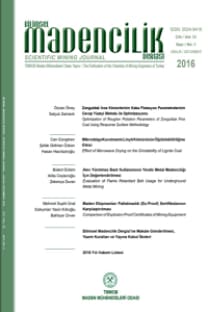DRENAJ KOSULLARININ MACUN DOLGU DAYANIMINA ETKİSİ
Yeraltı üretim boşluklarına yerleştirilen macun dolgunun dayanımı (in-situ) ile yeraltına benzer kür,
sıcaklık ve nem koşulları altında laboratuvarda hazırlanan macun dolgu numunelerinin dayanımı çoğu
kez farklılık arz etmektedir. Bu durum, muhtemelen dolgunun kendi ağırlığı ile oluşan konsolidasyon
etkisi, drenaj koşulları ve sıkıştırma basıncından kaynaklanmaktadır. Bu çalışmada, drenaj koşullarının
macun dolgunun kısa ve uzun dönem dayanım ve durabilitesine etkisi incelenmiştir. Bu amaçla, sülfür
içeriği yüksek maden atıklarından üretilen macun dolgu numuneleri drenajlı (delikli) ve drenajsız
(deliksiz) silindir numune kalıplarına dökülerek 7-360 gün kür süreleri sonunda tek eksenli basınç testine
tabi tutulmuştur. Elde edilen deney sonuçlarından drenajlı macun dolgu numunelerinin dayanımının
drenajsız numunelere göre daha yüksek olduğu görülmüştür. Ayrıca, atık, bağlayıcı (Portland Çimento,
PC 42,5; ve Yüksek Fırın Cürufu, YFC) ve karışım suyunun fiziksel, kimyasal ve mineralojik özellikleri
detaylı olarak incelenmiştir
Anahtar Kelimeler:
Drenaj, Macun Dolgu, Puzolan, Basma Dayanımı
Effect of Drainage Conditions on the Strength of Paste Backfill
The mechanical strength of paste backfill placed in underground openings (i.e. mine stopes) is
often different from the one predicted in laboratory studies even under similar curing conditions of
temperature and humidity. This observation is probably due to the specific self weight-consolidation
of backfill, drainage conditions and confinement pressure encountered in the backfilled stopes. In
this study, the effect of drainage conditions on the short-and-long term strength and stability of paste
backfill was investigated. For this reason, paste backfill samples produced from mine tailings with
relatively high sulphide content were placed into normal non-perforated cylinders and bottom perforated
plastic cylinders providing drainage conditions and then unconfined compressive strength tests were
performed on these samples after 7-to-360 days of curing periods. From the results of experiments, it
has been observed that the unconfined compressive strength values of drained paste backfill samples
are higher than normal ones. The physical, chemical and mineralogical characteristics of the tailings,
binders (Portland Cement, PC 42,5 and Blast Furnace Slag, BFS) and mixing water used were also
examined in detail
Keywords:
Drainage, Cemented Paste Backfi ll, Pozzolan, Compressive Strength,
- ISSN: 2564-7024
- Yayın Aralığı: Yılda 4 Sayı
- Yayıncı: TMMOB Maden Mühendisleri Odası
Sayıdaki Diğer Makaleler
OCAK TOZLARININ SU SPREYLERİ İLE BASTIRILMASININ MODELLENMESİ
KUTAN KORUYAN, ERCÜMENT YALÇIN, MEHMET POLAT
DRENAJ KOSULLARININ MACUN DOLGU DAYANIMINA ETKİSİ
BAYRAM ERÇIKDI, Ferdi CİHANGİR, Ayhan KESİMAL, Haci DEVECİ, İbrahim ALP
BAZI MAGMATİK KAYAÇLARIN KAYAÇ DAYANIM KATSAYISI VE SCHMIDT SERTLİĞİ ARASINDAKİ İLİŞKİLER
